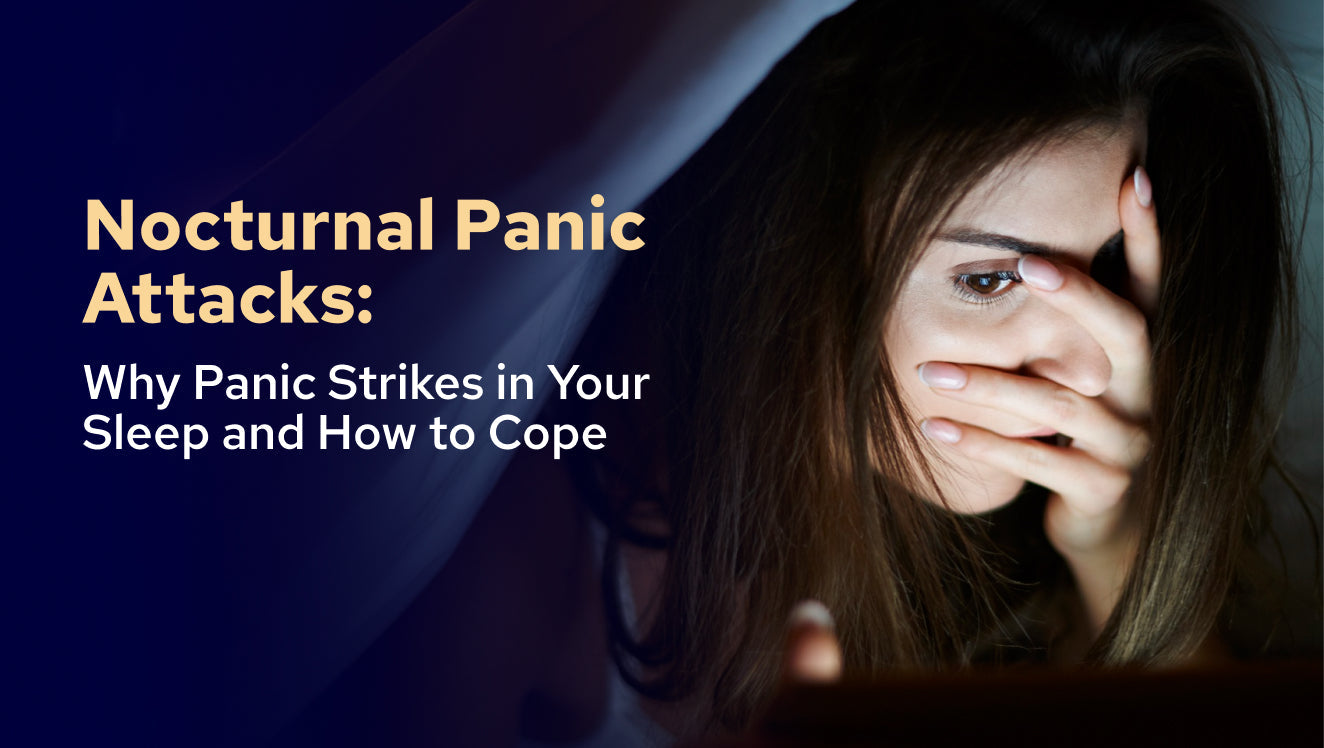Waking up in the middle of the night with your heart pounding, gasping for air, and an overwhelming sense of fear can feel terrifying. These episodes are known as nocturnal panic attacks, and they can leave you shaken, exhausted, and even afraid of going back to bed. Many people search for answers after experiencing a panic attack while asleep, wondering: What causes this? Is it dangerous? Can anxiety kill you in your sleep?
Here’s the truth: nocturnal panic attacks are deeply uncomfortable but not life-threatening. Anxiety itself cannot kill you in your sleep, but the physical symptoms can mimic more serious conditions like heart problems which is why they feel so frightening. The good news? With proper understanding, support, and treatment, nocturnal panic attacks can be managed and often reduced significantly.
In this article, we’ll explore what nocturnal panic attacks are, why they happen, and the best ways to cope with and prevent them.
What Are Nocturnal Panic Attacks?
A nocturnal panic attack is a sudden episode of intense fear or discomfort that occurs while you’re asleep, waking you up abruptly. They often come without warning, leaving you with a racing heart, shortness of breath, chest pain, sweating, trembling, or the feeling that something terrible is about to happen.
Unlike nightmares, you’re fully awake and aware during a nocturnal panic attack. You may struggle to calm down, and it often takes a long time to fall back asleep afterward.
These episodes usually affect teenagers and adults and are especially common in people who also have panic disorder during the day.
What Does a Nocturnal Panic Attack Feel Like?
Symptoms mirror daytime panic attacks, but they’re often intensified by the shock of waking suddenly. Common signs include:
-
Rapid heartbeat (palpitations)
-
Chest tightness or pain
-
Shortness of breath or choking sensations
-
Sweating or chills
-
Trembling or shaking
-
Tingling in the hands or feet
-
Nausea or dizziness
-
Overwhelming fear of dying or losing control
Some people mistake nocturnal panic attacks for heart attacks, which adds to the distress.
Also read - can stress and anxiety cause vertigo
Can Anxiety Kill You in Your Sleep?
This is one of the most common and most frightening questions people ask after experiencing a panic attack while asleep. The simple answer is: No, anxiety cannot kill you in your sleep.
A nocturnal panic attack feels life-threatening, but it isn’t. What’s happening is your body’s “fight-or-flight” response activating while you’re asleep. The adrenaline surge causes symptoms like a racing heart and breathlessness. While alarming, these physical reactions are not fatal.
However, it’s important to note: if you ever experience chest pain, difficulty breathing, or uncertainty about whether it’s a panic attack or a medical emergency, you should seek medical help immediately to rule out conditions like heart disease.
Why Do Panic Attacks Happen While Asleep?
The exact cause isn’t fully understood, but researchers believe nocturnal panic attacks stem from the same mechanisms as daytime ones: an overactive stress response.
Possible triggers include:
-
Stress and trauma – unresolved stress or traumatic memories may activate during lighter stages of sleep.
-
Hyperarousal – anxious brains often stay on “high alert,” even while resting.
-
Changes in brain chemistry – fluctuations in neurotransmitters like serotonin.
-
Medical factors – sleep apnea, insomnia, and other sleep disorders may contribute.
-
Genetics – family history of anxiety or panic disorder.
Who Is Most at Risk?
You’re more likely to experience nocturnal panic attacks if you:
-
Have panic disorder or anxiety disorders
-
Struggle with depression
-
Live with insomnia or sleep apnea
-
Use alcohol, caffeine, or certain substances excessively
-
Experience high stress or unresolved anger
How Are Nocturnal Panic Attacks Diagnosed?
Doctors usually diagnose based on symptoms and by ruling out other health issues. Tests may be ordered to check heart and thyroid function, as these conditions can mimic panic symptoms. Once physical causes are excluded, a mental health professional may diagnose panic disorder and recommend treatment.
How to Stop a Panic Attack While Asleep
Once a nocturnal panic attack begins, the key is riding it out the symptoms usually peak within 10 minutes. Helpful techniques include:
-
Deep breathing exercises – slow, controlled breathing can calm the nervous system.
-
Progressive muscle relaxation – tensing and releasing muscle groups reduces tension.
-
Grounding techniques – reminding yourself “This is panic, not danger.”
-
Mindfulness – noticing sensations without judgment can shorten the attack.
Treatment for Nocturnal Panic Attacks
Treatment often mirrors daytime panic attack care. Options include:
-
Cognitive Behavioural Therapy (CBT) – helps reframe anxious thoughts and break panic cycles.
-
Medications – antidepressants (SSRIs, SNRIs), anti-anxiety medications, and sometimes beta-blockers for physical symptoms.
-
Lifestyle approaches – regular exercise, limiting caffeine and alcohol, consistent sleep schedules.
Some people also find nervous system-regulating tools helpful before bedtime, such as calming light or sound therapies. (For example, technologies like neuroVIZR are designed to gently guide the brain into more balanced states, which can support deeper rest and resilience.)
How to Prevent Nocturnal Panic Attacks
You can lower your risk with proactive steps:
-
Stick to a regular sleep routine.
-
Avoid caffeine, alcohol, and heavy meals before bed.
-
Practice relaxation techniques (breathwork, meditation, gentle yoga).
-
Create a calming pre-sleep ritual (reading, journaling, or dim lighting).
-
Address daytime stress so it doesn’t carry into sleep.
Living With Nocturnal Panic Attacks
While they’re distressing, it’s important to remember nocturnal panic attacks are not life-threatening. They are treatable, and with proper care, most people see major improvement.
If panic attacks are disrupting your life or sleep, seek support. With therapy, lifestyle changes, and sometimes medication, recovery is possible.



























Share:
Handling Anxiety in a Relationship: A Complete Guide
Is PTSD a Disability?